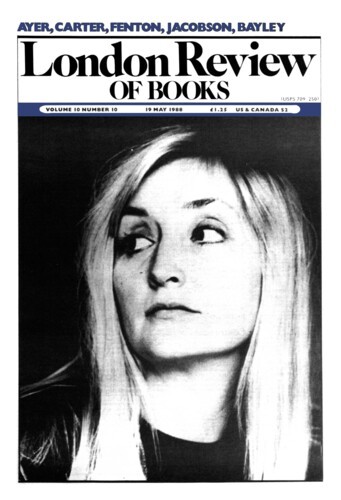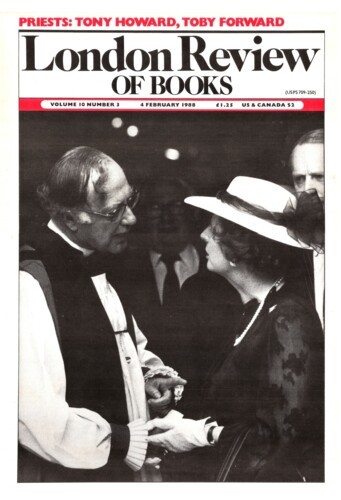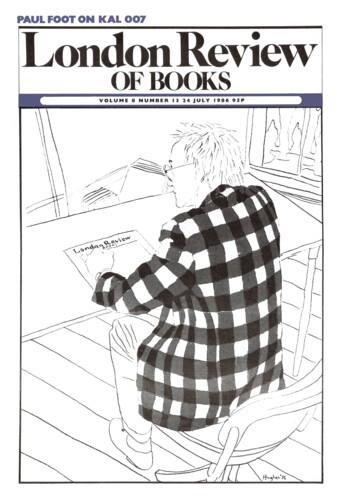A.J. Ayer
A.J. Ayer, who died in 1989, was the author of Language, Truth and Logic, published in 1936 when he was 25, and The Problem of Knowledge, among other books. After the war he became Grote Professor of the Philosophy of Mind and Logic at UCL and between 1959 and 1978 was Wykeham Professor of Logic at Oxford.
Someone might go into the past
A.J. Ayer, 5 January 1989
Professor Hawking’s Brief History of Time thoroughly deserves the praise with which it has been widely received. With only one formula, Einstein’s celebrated E = mc2, which he could just as well have put into prose simply by saying that energy is the arithmetical product of mass and the square of the velocity of light, Hawking gives a more lucid account than any that has yet come my way of such arcane matters as quantum theory and its wave-particle duality, the general and special theories of relativity, the blending of space and time into a four-dimensional continuum, the ways in which physicists measure the age and structure of the universe, the ‘big bang’ with which it is thought to have started, the reasons for holding that it continues to expand, the shrinkage of stars into ‘black holes’.
Psychoneural Pairs
A.J. Ayer, 19 May 1988
The problem first of clarifying and then of answering the questions how far human thoughts and actions are subject to causality and whether this is consistent with their being free is one to which many different approaches have been made throughout the history of philosophy. I doubt if any of them has been the product of such intense research as Professor Honderich has devoted to the construction, the defence and the evaluation of his theory of determinism. Agreement among philosophers, especially on fundamental questions, is difficult to reach, and I shall be arguing against Honderich’s theory at many crucial points. Nevertheless, I think that his readiness to accept even the most startling implications of his views, the patience he displays in examining alternatives to them, his assiduity in setting out and trying to meet a wide range of objections, are all highly creditable to him.
Fateful Swerve
4 February 1988
Making truth
24 July 1986
Pieces about A.J. Ayer in the LRB
Old Scores
Colin McGinn, 30 August 1990
When I was a quivering graduate student at Oxford in 1973, fresh from the Northern provinces, I sat for the John Locke Prize, a voluntary two-day examination for Oxford postgraduates in...
V.G. Kiernan on the high price of poison
V.G. Kiernan, 23 June 1988
Slavery has been ubiquitous in history, with innumerable forms and functions: something of the truth of human nature is revealed by this fact. Horace saw nothing wrong in it, though himself the...
Minimalism
David Pears, 19 February 1987
Philosophy’s critics have a variety of criteria from which to choose. The first question to ask about any philosopher’s claims is whether they are true. But there are other questions...
A Billion Years a Week
John Ziman, 19 September 1985
A computer is a tool, working the intentions of its designer or user. It is no more malevolent than the village clock whose chimes wake us in the night, or the car whose failed brakes run us...
An End to Anxiety
Barry Stroud, 18 July 1985
Wittgenstein predicted that his work would not be properly understood and appreciated. He said it was written in a different spirit from that of the main stream of European and American...
The philosopher contemplates his burnt wings
David Pears, 18 October 1984
The seventh volume of Russell’s Collected Papers contains the core of a book which he never completed. He stopped working on it, probably because he felt that he could not honestly go on....
Gains in Clarity
P.F. Strawson, 4 November 1982
‘Philosophy in the 20th century’ or ‘Analytical philosophy in the 20th century’? Ayer is well aware that the two descriptions are not co-extensive. He marks his...
Short Books on Great Men
John Dunn, 22 May 1980
To be truly a Master is to have authority. To claim to be a Master is to claim to possess authority. We can be confident that more persons claim to have authority than do truly have it. What is...
Read anywhere with the London Review of Books app, available now from the App Store for Apple devices, Google Play for Android devices and Amazon for your Kindle Fire.
Sign up to our newsletter
For highlights from the latest issue, our archive and the blog, as well as news, events and exclusive promotions.





